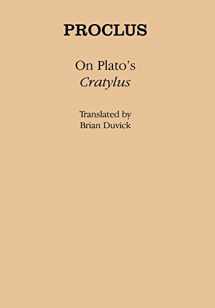
On Plato's "cratylus" (Ancient Commentators on Aristotle)
ISBN-13:
9780801446566
ISBN-10:
0801446562
Author:
Proclus
Publication date:
2007
Publisher:
Cornell University Press
Format:
Hardcover
224 pages
Category:
Greek & Roman
,
Philosophy
FREE US shipping
Book details
ISBN-13:
9780801446566
ISBN-10:
0801446562
Author:
Proclus
Publication date:
2007
Publisher:
Cornell University Press
Format:
Hardcover
224 pages
Category:
Greek & Roman
,
Philosophy
Summary
On Plato's "cratylus" (Ancient Commentators on Aristotle) (ISBN-13: 9780801446566 and ISBN-10: 0801446562), written by authors
Proclus, was published by Cornell University Press in 2007.
With an overall rating of 4.0 stars, it's a notable title among other
Greek & Roman
(Philosophy) books. You can easily purchase or rent On Plato's "cratylus" (Ancient Commentators on Aristotle) (Hardcover) from BooksRun,
along with many other new and used
Greek & Roman
books
and textbooks.
And, if you're looking to sell your copy, our current buyback offer is $0.3.
Description
Proclus' commentary on Plato's Cratylus is the only ancient commentary on this work to have come down to us, and is illuminating in two special ways. First, it is actually the work of two Neoplatonists. The majority of the material is supplied by the Athenian-based Proclus (c. 411-485 AD), who is well known for his magisterial commentaries on Plato's Timaeus and Parmenides, as well as for a host of other works involving the study of Plato. This material we have consists of excerpts from Proclus' commentary edited by another figure who appears to be a Platonist working somewhat later in Alexandria. Consequently it contains insights into the philosophy of both of the principal late antique centers of Platonism, Athens and Alexandria. Secondly, the material is divided between the grittier issues of language-theory, on which it engages freely with other ancient philosophies, and theological discussion mostly involved with the etymologies of the names of Greek gods, in which Proclus is more concerned to relate his own brand of Platonism to the 'Orphic' and 'Chaldaean' theological systems, and also to Homer. Brian Duvick's extensive notes bring out all these facets of the ancient text.


We would LOVE it if you could help us and other readers by reviewing the book
Book review

Congratulations! We have received your book review.
{user}
{createdAt}
by {truncated_author}


